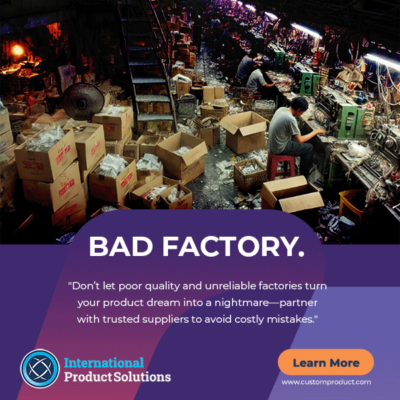The 10 Most Common Problems with New Product Manufacturing at a BAD FACTORY
Your product idea is fantastic. Your design and engineering development is complete. You have placed your first purchase order with a factory halfway around the globe. Your order finally ships after months of waiting and worrying. You get the call from your warehouse manager after the container has been delivered and inspected, and your worst nightmare becomes a reality. The goods are damaged, the quality is sub-par, and the product faulty and off spec. Your supplier is unwilling to help, and you are left with unsellable goods and no options. This story is not uncommon…it happens with more and more frequency as U.S. brand owners gain more accessibility to thousands of factories in China and Asia. The supplier landscape is broad and diverse.
At IPS we are your agent and resource that safeguards you against the above scenario. Over the last 25 years of production management, we have seen it all. Here’s a list of the most common problems that can arise during the first run of manufacturing when working with a factory that may not be up to par.
Poor Quality Control
Inconsistent Product Quality: Variations in product specifications, size, or performance.
Material Substitution: The factory might use lower-grade or inappropriate materials.
Lack of Testing: Failure to run proper tests on products, leading to malfunction or safety concerns.
Visual Defects: Misaligned parts, scratches, or finish imperfections due to poor handling or subpar equipment.
These problems can be minimized with a custom-tailored Custom Product Quality Control Plan that is put into place before production even starts on your product.
Communication Issues
Language Barriers: Misinterpretation of requirements or specs due to poor communication.
Slow Response Time: Delays in responding to queries or addressing production issues.
Misunderstood Specifications: Inaccuracies in following the product design and functionality specs due to inadequate technical expertise.
Working with experienced factories is the only way to avoid these issues. You need to know the history and reputation of the factory with which you are working. Avoid choosing a factory based on “lowest price” considerations only.
Production Delays
Lack of Experience: The factory may not be familiar with the product type, leading to prolonged setup times.
Equipment Malfunction: Poorly maintained machines or improper tooling can slow production.
Unskilled Labor: Inexperienced workers may cause slower production rates and higher error rates.
Labor Shortage: Factories with bad reputations cannot retain consistent labor force and adequate production capacity.
Inaccurate Prototyping
Mismatch Between Prototype and Production: Differences between the prototype and mass-produced product due to the factory’s inability to scale processes effectively.
Tooling Issues: Inaccurate or improperly developed tooling that leads to defects in the final product.
Antiquated Technology: Utilizing prototyping methods and machinery that is sub standard or antiquated leading to confusion between
Cost Overruns
Hidden Costs: Additional charges due to rework, material waste, or improper planning.
Excess Scrap/Waste: Poor production management can lead to significant waste of materials, driving up costs.
Unreliable Cost Estimates: Unexpected expenses due to factory inefficiency or underestimating complexity.
Lack of Proper Documentation
Inadequate Process Documentation: Inconsistent processes due to lack of clear manufacturing instructions, causing quality issues.
Poor Traceability: Difficulty in tracking faulty parts or batches due to lack of records, complicating troubleshooting, and quality assurance.
Inconsistent Supply Chain Management
Raw Material Shortages: Poor planning or supplier relationships can result in material shortages that delay production.
Unreliable Delivery Times: The factory may miss deadlines or fail to meet agreed shipping schedules.
Non-compliance with Standards
Failure to Meet Regulatory Standards: Lack of adherence to industry standards, safety protocols, or certifications.
Substandard Working Conditions: Factories with poor working conditions can lead to labor staffing problems, government intervention and inefficient production.
Limited Scalability
Unable to Ramp Up Production: Difficulty scaling up production as demand grows, leading to delays or inconsistent product quality.
Capacity Constraints: The factory may lack the machinery, expertise, or workforce to manage larger production volumes.
Supply Chain and Logistic Failures
Packaging Problems: Incorrect packaging leading to damaged goods during transit.
Shipping Delays
Lack of experience in international logistics, customs documentation, and shipping regulations.
These issues can compound and result in costly delays, rework, and damage to the brand reputation, which is why selecting a reliable, experienced factory is crucial after a difficult start. Don’t let your brand die because of these issues, partner with IPS today for all your product needs.
Contact Us

